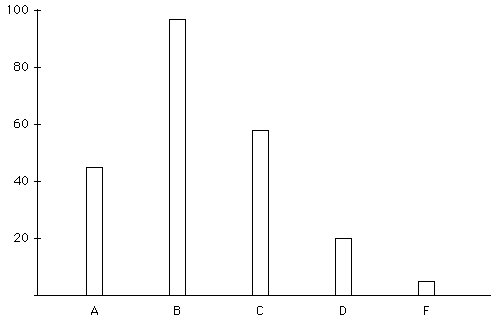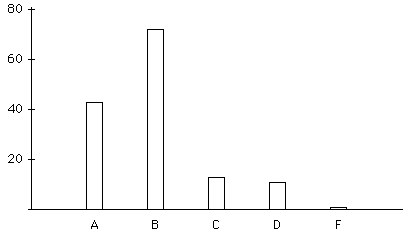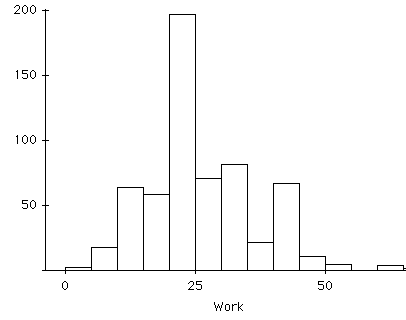Committee Activities - 1999-2000
- The committee was asked to undertake an analysis of all 184 general purpose classrooms
(classrooms that belong to no single department of college).
The course schedule was reviewed and at least one faculty member was selected to review a room in which they were teaching. An ad was placed in the Daily Cougar urging students and faculty to review our classrooms.
By October 9, 95% of the general purpose classrooms had been reviewed by at least one faculty
member or student. A total of 242 independent evaluations were received. When two or more evaluations were reported for the same room the evaluations were averaged.
All UH students, staff and faculty were encouraged to review the evaluation of
General Purpose Classrooms and to participate in a
survey.
Evaluations of General Purpose Classrooms, September, 1999
The median grade is a B and the average grade is a 2.70 (a B- or C+)
The committee was asked to undertake an analysis of all 207 assigned classrooms and class laboratories at UH
Assigned classrooms are literally assigned to an academic unit. The dean of each unit with assigned classrooms was contacted and asked to complete a brief survey. By October 14, 1999 approximately 75% of the 207 assigned classrooms and class laboratories had been evaluated by the departments that control the use of these areas.
All UH students, staff and faculty are encouraged to review the self-evaluation of these assigned classrooms and class laboratories.
Evaluations of Assigned Classrooms and Class Laboratories, September, 1999

The median grade is a B and the average is a 3.05 (B)
In cooperation with the Course Demand Task Force (chaired by John Hardy, associate dean in the College of Natural Sciences and Mathematics), a survey of nearly 1,000 students enrolled in freshman and
sophomore courses in the fall semester of 1999 was undertaken in September, 1999. In addition to
questions about the amount of off-campus work they were engaged in and their "ideal" academic
schedules, each student was asked to grade the classroom in which they were completing the brief
survey. A Preliminary Analysis of the student evaluations of their classroom is now
available.
As a matter of general interest, 68% of the students reported that they were working this semester. The median hours worked per week was 20 and the average was 24.5. The distribution of percentage of students working and average hours worked varied only slightly across time bands. In other words, students taking a course at 8:30 - 10:00 AM, Tuesdays and Thursdays, worked about the same amount as students taking courses at any other time of day. Approximately 65% of these students reported that they were working an average of 23.5 hours per week.

Therefore, the average student (890 respondents) works an average of 16 hours per week -- remember that 32% report no hours worked. The average student is enrolled in about 11 semester hours this semester. If, as many of us believe, students should spend 2 to 3 hours per week studying for every hour spent in class then these students should be spending at least 20 to 30 hours per week studying, 11 hours per week in class, 16 hours per week working, and some 6 hours per week moving from home to school to job. This amounts to some 50 to 60 hours per week. A difficult schedule made even more difficult when you factor in all of the other things that people do.
Committee members:
- Ed Apodaca, Associate Vice President, Enrollment Management
- John C. Butler, Associate Dean, NSM and Chair
- Agnes DeFranco, Assistant Professor, HRM
- Barbara Fasser, Executive Associate, Academic Budget
- Dennis Fouty, Associate Vice Chancellor, Associate Vice President, Central Computing and Telecommunications Systems
- Jim Hicks, Director, Architectural Services
- Rick Kasschau, Professor, Psychology
- Mario Lucchesi, Registrar
- Rosalie Maddocks, Professor, Geosciences
- Steve Mintz, Associate Dean, HFAC
- Joe Schroeder, Director, University Media Services
- Illeana Trevino, Executive Director, Affirmative Action
- Cecil Ward, Analyst, OPPA
- Tom Wray, Executive Director, Plant and Operations
-
The Whole Committee
Return


